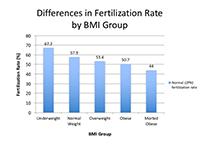Small study shows lower oocyte quality among morbidly obese
Source: MedPage Today
by Molly Walker, Contributing Writer
Images courtesy of the study authors.

Increasing body mass index (BMI) was found to have a significant impact on oocyte quality in in-vitro fertilization (IVF), with a nonsignificant trend towards decreasing pregnancy rates at both ends of the BMI spectrum (underweight and morbidly obese), researchers said here.
 In a small, cross-sectional study that adjusted for age, ethnicity, total gonadotropins, which stimulate fertility, and estradiol level, a significant association was found between increasing BMI and the rates of abnormalities in the oocytes, such as fracturing or atresia (P=0.0009), according to Martha W. Noel, MD, of the University of California San Francisco, and colleagues.
In a small, cross-sectional study that adjusted for age, ethnicity, total gonadotropins, which stimulate fertility, and estradiol level, a significant association was found between increasing BMI and the rates of abnormalities in the oocytes, such as fracturing or atresia (P=0.0009), according to Martha W. Noel, MD, of the University of California San Francisco, and colleagues.
BMI also had a significant effect on 2PN fertilization rate, or the process of when the egg is joined together with the sperm in IVF (P=0.01), they said in a presentation at the Society for Reproductive Investigation annual meeting.
"Extremes of BMI do have a negative impact on oocyte quality and embryo implantation," said co-author Lusy Aghajanova, MD, PhD. "Patients should be encouraged to maintain normal body weight to improve their outcomes."
The researchers examined 808 women undergoing an IVF cycle. BMI was classified according to World Health Organization standards. The majority (n=482) had a normal BMI (18.5-24.9 kg/m2), with only 23 morbidly obese, and 16 underweight participants. This study only examined fresh embryos, not ones that had been previously frozen.
While there was no statistically significant difference on clinical outcomes, such as pregnancy rate or live birth rate, there was a trend towards decreasing rates of implantation rate, clinical pregnancy rate, as well as pregnancy and birth outcomes from normal weight to morbidly obese. Underweight and morbidly obese individuals also had lower pregnancy and birth rates.
 When asked by a participant if this was an issue of the statistical model they used, Aghajanova said that a larger study would likely show a greater difference in outcomes.
When asked by a participant if this was an issue of the statistical model they used, Aghajanova said that a larger study would likely show a greater difference in outcomes.
"There was a trend in clinical outcomes, so if we increase power, we probably will notice some difference," she said.
The question was also raised about whether decreasing implantation rate with increasing BMI could be because the blastocysts -- laboratory-cultured embryos in IVF -- are under greater stress.
"I believe there are some changes on the endometrium level," Aghajanova said.
-
Primary Source
Society for Reproductive Investigation
Source Reference: Noel MW, et al "Influence of body mass index on measures of oocyte quality in patients undergoing IVF" SRI 2016; Abstract O-159. -
Related Links:

